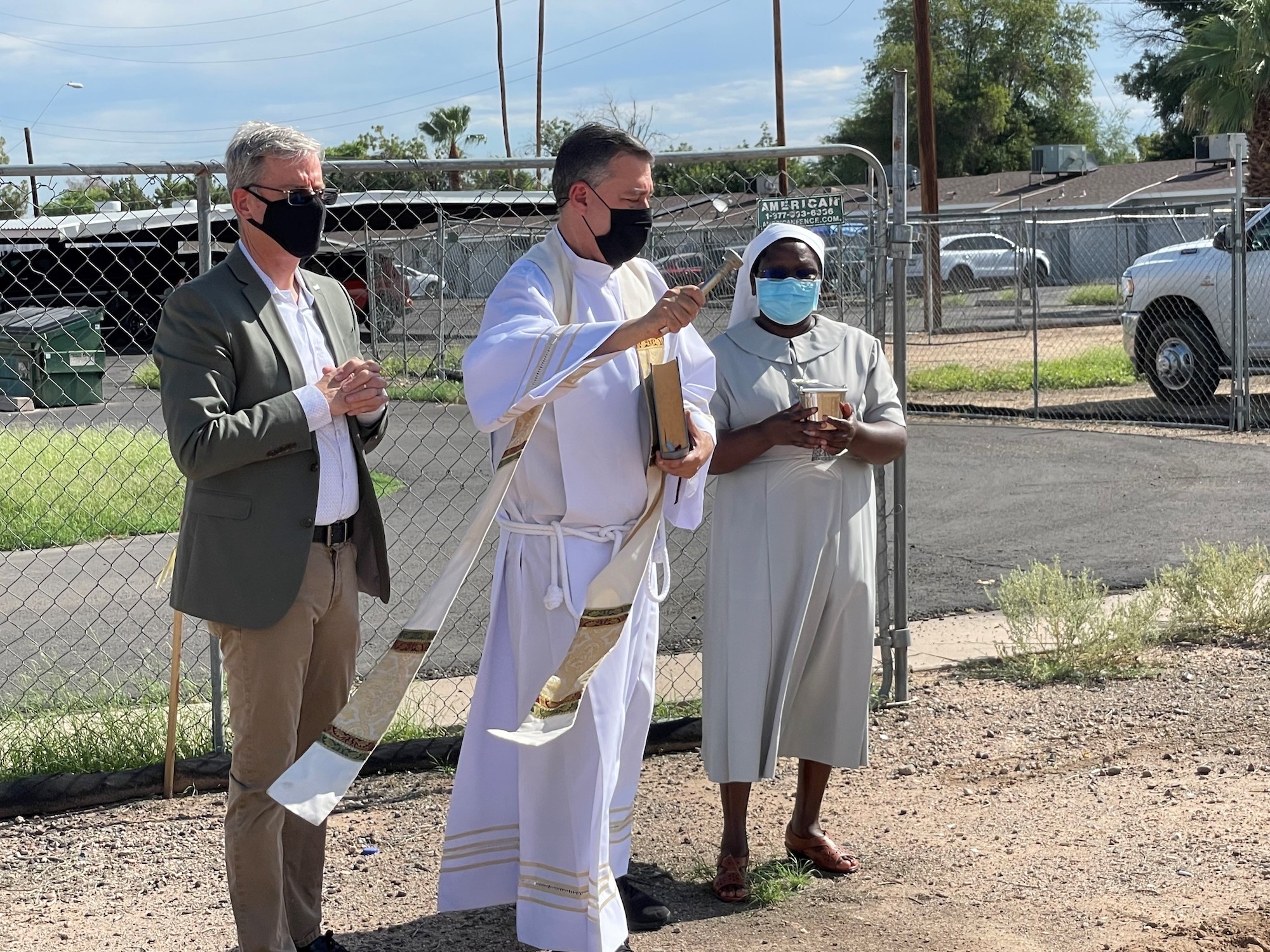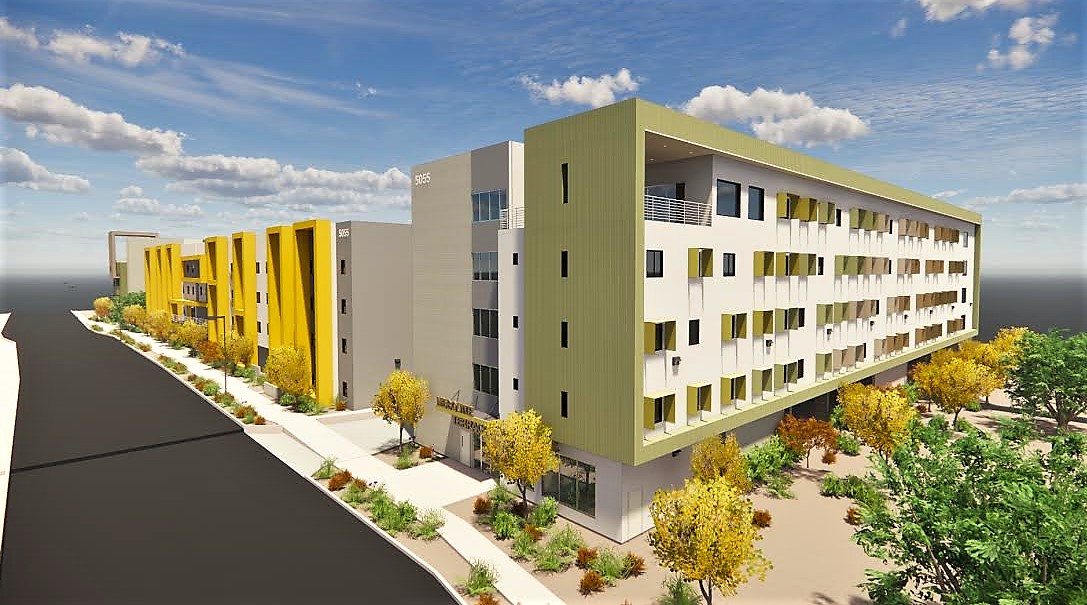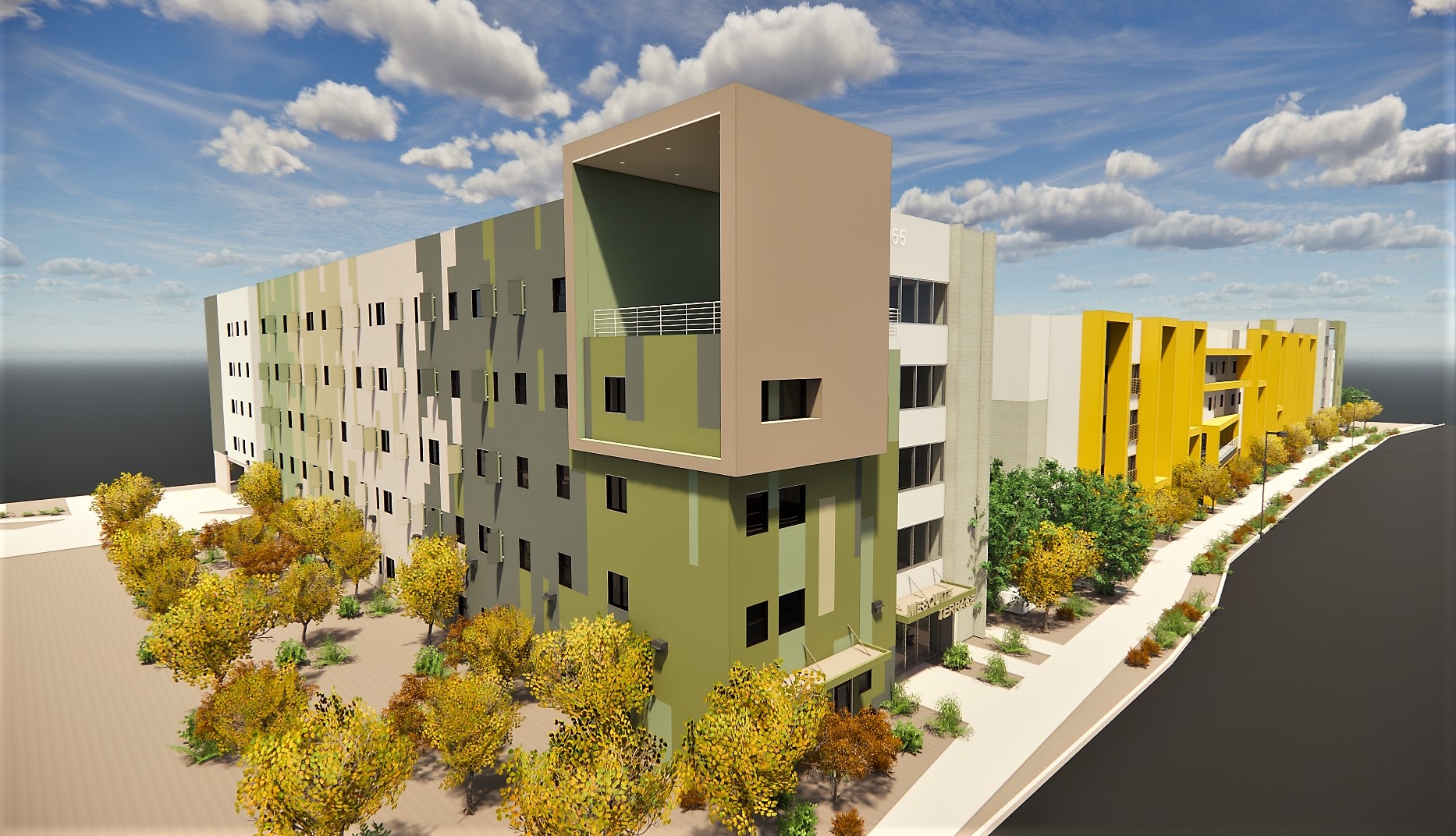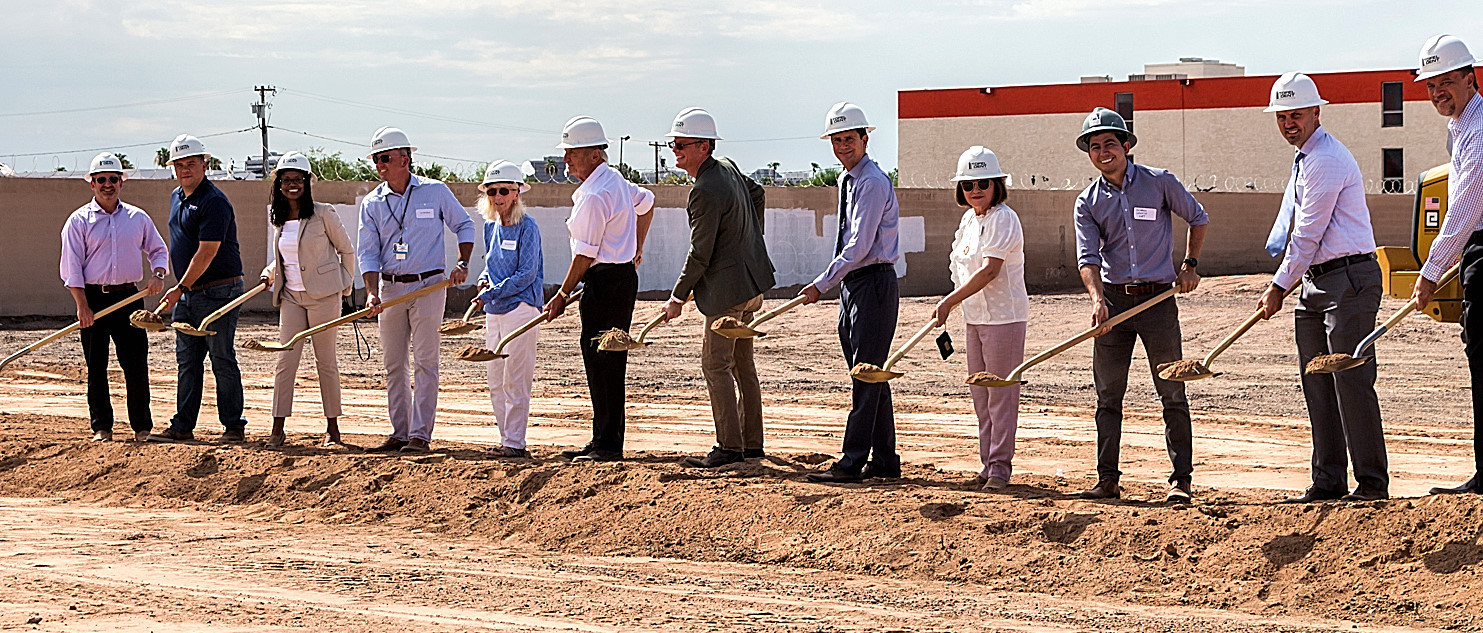
PHOENIX — Sparked by a donor’s gift and a resolve to provide the needy with safe, affordable housing, Catholic Charities Community Services — through its affiliate, Housing for Hope, Inc. and its co-development partner, Trinity Housing Development from Springfield, Mo. — is embarking on is embarking on a new 300-unit residential development in central Phoenix that will be accompanied by relocation of the agency’s administrative offices.
Organization leaders joined Catholic Charities’ housing affiliate, Housing for Hope, Inc., as well as construction and architectural partners and several housing agency representatives to break ground on the new Mesquite Terrace development last week in the city’s Solano Neighborhood near 19th Ave. and Camelback Road. Completion of the first units is expected by the end of 2022. All 297 units should be finished by the end of 2023.
“Mesquite Terrace addresses the desperate need for affordable housing in the Valley,” said Catholic Charities President and CEO Paul Mulligan. “As a community, we’re a long way from overcoming the shortage, but that’s why we created Housing for Hope, Inc. — to take an aggressive role in the effort and partner with other Valley organizations and developers to provide solutions.”
When finished, the three-building development on nearly 4 acres will offer 129 one-bedroom, 78 two-bedroom and 90-three-bedroom apartments ranging in size from 575 to 1,050 square feet. Eleven units are reserved for military veterans as part of the City of Phoenix’s HOME Program, and rental rates for all apartments will be based on a tenant’s income.

Amenities will include secure bicycle parking, a sports court, outdoor children’s play area, resident community rooms and outdoor patio spaces. The buildings will stand in a horseshoe-shaped layout surrounding the sports court with a single entrance and exit to the court area to discourage use by outsiders and foster a sense of community among residents.
“We designed it to create a safe, secure park-like setting, where residents can play, gather, sit or barbeque,” Mulligan explained. “There also will be top-floor balcony areas where residents can look out across the city.”
The location also fits Catholic Charities’ desire to site safe, secure housing close to public transit, in neighborhoods were retail, commercial and recreation are within walking distance.
The agency has other plans for the area as well.
As the agency studied the project, opportunities arose to relocate administrative offices from 7th Avenue on a parcel next to the new apartments. The move will allow easy access to agency resources and support Catholic Charities mission of going beyond brick and mortar to help the less fortunate by meeting their spiritual needs.
“Creating community is a big part of what we are about,” explained Catholic Charities Vice President of Business Development and Housing for Hope Executive Director Steve Capobres. “People getting to know one another, seeing if we can help one another, caring for one another. Jesus boiled it down to, ‘love God and love people.’ I think we are doing both here — serving those in need we are loving God by providing services we’re loving our neighbor.”
Organization leaders would be the first to say the project won’t solve the Valley’s affordable-housing problem.
According to a 2021 report by the National Low Income Housing Coalition titled “Out of Reach,” Arizona has 183,652 extremely low-income (ELI) renter households. For every 100 ELI renter householders, there are only 26 affordable, available units.
“For every five units of need, we only have one unit available,” Mulligan said. “There is a real supply-and-demand problem. The rental prices continue to increase. The demand continues to grow.”
Arizona is not alone.
The United States has a shortage of 6.8 million affordable, available rental homes for extremely low-income renters, whose household incomes are at or below the poverty guideline or 30 percent of their area median income, according to the Coalition’s report. Working at a minimum wage of $12.15 an hour, an individual would have to work 60 hours to afford a modest 1-bedroom rental home at Fair Market Rent, according to the coalition.
Housing for Hope has been addressing the issue for a number of years.
The 501c3 organization partners with developers and other state and local organizations to create ways to fund, develop, and operate housing that is safe and affordable, and creates a true community for low-income families, seniors and individuals, the agency said.
In addition to Mesquite Terrace, Catholic Charities owns and operates eight affordable-housing communities – seven in metro Phoenix, one in Cottonwood – that provide 400 apartments. Catholic Charities also provides a range of services to tenants.
Several entities are helping make the $63.6 million Mesquite Terrace happen.
Financing includes tax-exempt bonds through the City of Phoenix Industrial Development Authority, Low Income Housing Tax Credits (LIHTC) from the Arizona Department of Housing – which is about $29 million in equity — $1 million from the Phoenix Community Development and Investment Corporation, $1 million from
City of Phoenix HOME Funds and deferred developer fees.
Since 2011, Housing for Hope has been instrumental in rehabilitating or developing nearly 400 units with its main focus in Maricopa County. Projects include Rosewood Court I and II, and Laurel Tree at Northern, all in Phoenix; Ironwood Village in Glendale; Desert Willow Apartments in Tempe. Non-LIHTC projects include Verde Villas; St. Gerard House, St. Lawrence House, St. Michael’s Crossing, St. Bernadette’s Place, and Goodyear Homes.

Others are making Mesquite Terrace a reality as well.
Tofel Dent Construction, Inc. is the general contractor and Architectural Resource Team will provide architectural services. Biltmore Properties, Inc., which currently manages 4,304 affordable housing units in Arizona, will manage the community.
It is possible that none of the players would have come together were it not for the generosity of one donor couple well acquainted with giving in the Diocese of Phoenix.
Wolfgang and Nancy Monthofer had given to the diocese’s capital campaign for years when they began preparing for Wolfgang’s retirement as a dental technician. Raised Catholic in his native Germany, Wolfgang had moved to Phoenix and served in the U.S. Army at age 20. He met Nancy while stationed in the 5th Army Central Dental Laboratory in St. Louis. Following a return to Arizona, he worked hard and the couple did well, according to Nancy. “America has been good to us,” she stated in an email.
Their love of God, belief in the Diocesan campaign, and the leadership of Bishop Thomas J. Olmsted, led them to gift the building to the Diocese for charitable purposes. The Diocese later contacted Catholic Charities, Mulligan recalled.
“The Diocese knew we had an interest in properties along light rail. They reached out to us, and said, ‘We have a donor. Would you like to take a look?’” he recounted. After Catholic Charities and the Diocese inspected the office building and the necessary details were worked out, Catholic Charities leaders noticed the structure directly north of the Monthofers’ building was for sale, and that the properties to the south might be potential acquisitions, too.
Catholic Charities officials, including Capobres, see God’s hand clearly at work in all this.
“The way it came together, the timing and ability to cobble together these properties — We had been talking about an administrative center and wanted it along light rail. We had started looking, and through a series of events, we were able to acquire different parcels in the same area. This kind of thing just doesn’t happen without God being involved in it.”







